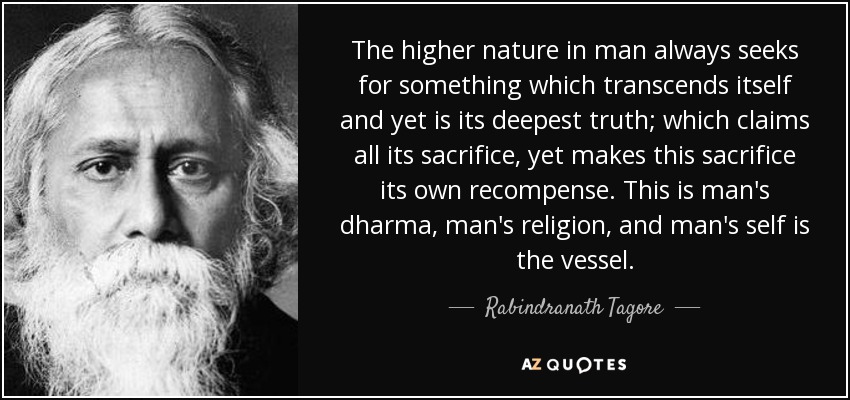Nature Of Man – Rabindranath Tagore -Philosophy Notes – For W.B.C.S. Examination.
মানুষের প্রকৃতি – রবীন্দ্রনাথ ঠাকুর-দর্শনের নোটস – WBCS পরীক্ষা।
Whatever man does bears the imprint of his being. In the case of man what he is and what he is able to do cannot be neatly demarcated. Thought and action do not only interpenetrate but also interact in human situation: one influences and is influenced by the other.Continue Reading Nature Of Man – Rabindranath Tagore -Philosophy Notes – For W.B.C.S. Examination.
Philosophy is essentially a reflective activity partly expressing and partly concealing its author. The demand of the ‘scientistic’ philosopher that knowledge worth the name must be completely impersonal betrays his lack of understanding of the reflective character and anthropological root of knowledge. Complete impersonalization of knowledge (and action) is humanly impossible. For man can never get rid of himself either in knowing or in doing.
The impossibility of knowledge without knower and doing without doer does not imply merely a linguistic relativity but a deeper conceptual interdependence of such pains of concepts as knowledge-knower, doing-doer, and action-agent. This is a very old but important view. The anthropological orientation of the Indian thinkers in general and the contemporary ones in particular are very clear indeed. The dualism between nature and man or that between pure reason and practical reason has never been a dominant feature of Indian philosophy, and in this respect its difference from European philosophy is noteworthy. Knowledge, whether it be of nature or of man, is regarded by most of the Indian philosophers as a necessary condition of human perfection.
Rabindranath Tagore (1861-1941) was a poet-philosopher. Though great
he is as a poet, but that is no reason why his philosophical position should
not be properly and critically appreciated. Steeped in Upanisadic idealism, his
philosophical views are full of creative insight, and remarkable for their
consistency, clarity and beauty. Tagore does not use philosophical jargons,
and that lends grace to his expressions and never makes his ideas obscure. The
central theme of his thought is harmony, harmony between science and art,
finite and infinite, life and death, god, nature and man. The key concept of
his philosophy of harmony is man. ‘Reality is the expression of personality,
like a poem, like a work of art’.
Tagore uses the term personality in a very philosophical sense. Person
unrelated to the world, he says, is a mere abstraction. Real world is human
world. Its true identity is not fully disclosed to our perceptual self but only
to our emotional self. To the sense-mind world is a ‘guest’ and to the emotive
mind a ‘kinsman’. In sense-perception man is mainly passive and recipient,
and cannot assimilate deeply all that he receives from the world around him.
Please subscribe here to get all future updates on this post/page/category/website


 +919674493673
+919674493673  mailus@wbcsmadeeasy.in
mailus@wbcsmadeeasy.in







































































































